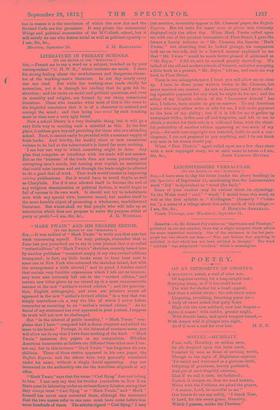"MARK TWAIN" AND HIS ENGLISH EDITOR.
[TO THE EDITOR OF THE "SPECTATOR."]
SIR, —It was unkind of "Mark Twain" to write you that note last week concerning myself. You may, perhaps, remember that in June last you permitted me to say in your journal that a so-called "revised edition" of "Mark Twain's" sketches, recently issued here by another publisher "consisted simply of my own revised editions transposed ; in fact, my little books seem to have been sent to some one in New York who returned the sketches intact, but with the arrangement a little altered ;" and in proof, I further stated that certain very forcible expressions which I left out as unneces- sary were also curiously left out in the "revised edition," and certain new titles given by me turned up in a most unaccountable manner in the new "author's revised edition " ; and the punctua- tion, English orthography, and even our printer's errors all appeared in the new "author's revised edition" in a way that was simply marvellous—in a way the like of which I never before remember as occurring to an "author's revised edition." As no denial of my statement has ever appeared in your journal, I suppose its truth will not now be challenged.
But "in the interest of public morality," "Mark Twain" com- plains that I have "composed half-a-dozen chapters and added the same to his books." Perhaps, in the interest of common-sense, you will allow me to say that I have done nothing of the kind. "Mark Twain" instances five papers as my composition. Whether American humourists as fathers are different from other men I can- not say, but in this instance" Mark Twain" has forgotten his own children. Three of these stories appeared in his own paper, the Buffalo Express, and the others were very generally circulated under his name, without a single denial appearing. Any one interested in the authorship can see the American originals at my office.
"Mark Twain" says that the name "Carl Byng" does not belong to him. I can only say that his brother journalists in New York State must be labouring under an extraordinary delusion, seeing that they always treat "Carl Byng" as "Mark Twain," and " Mark " himself has never once' corrected them, although the statement that the two names refer to one man must have come before him some hundreds of times. The articles signed "Carl Byng," I may just mention, invariably appear in Mr. Clemens' paper, the &jab Express. But his taste for many noms de plume was curiously displayed only the other day. When Mark Twain called upon me with one of the greatest humourists of Fleet Street, I gave the former a hearty welcome as "Mr. Clemens, the famous Mark Twain,'" but observing that he looked glumpy, his companion took me on one side, and in a hurried manner explained to ma that "Mr. Twain" would be much better pleased if addressed as. "Mr. Bryce." I did so, and he seemed greatly cheered up. We talked of the old and modern schools of humour, and after accepting a little book as a present, "Mr. Bryce" left me, and made his way back to Fleet Street.
There is one misapprehension I trust you will allow me to clear up. I have in three years written thrice to Mr. Clemens, but never received one answer. As late as January last I wrote, offer- ing equitable payment for any work he might do for me ; and the editor of my English edition of the "Innocents Abroad" has. also, I believe, been unable to get an answer. To any American author who may either write or edit for me, I will make payment to the best of my ability ; but if it is left for me to gather up newspaper trifles, trifles cast off and forgotten, and left to me to obtain a market for their sale in a collected form, with the cheer- ful probability of another edition appearing at one-sixth of my price,—for such non-copyright raw material, liable to such a con- tingency, I am not prepared to pay anything, and I do not think any man in his senses would pay.
When "Bret Harte's " agent called upon me a few days since with a new copyright story, we at once came to terms.—I am,


































 Previous page
Previous page